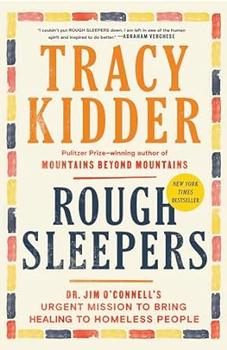Summary | Excerpt | Reviews | Beyond the Book | Readalikes | Genres & Themes | Author Bio

Dr. Jim O'Connell's urgent mission to bring healing to homeless people
by Tracy KidderI
The Van
Around ten on a warm September night, the outreach van stopped in the kind of South Boston neighborhood said to be "in transition." On one side of the street was a new apartment building, its windows glowing, its sidewalk lit by artful imitations of old-fashioned streetlamps. On the other side, in murky light, stood an abandoned loading dock. A heap of blankets lay on the concrete platform. Someone passing by wouldn't have known they were anything but discarded blankets. But when the driver of the van walked up the steps and spoke to them, saying he was doing a wellness check, a muffled voice came back from underneath: "F*** you. Get the f*** outa here."
The driver turned away and shrugged to Dr. Jim O'Connell, who was standing at the bottom of the steps. "Let me try," the doctor said, and he climbed up to the platform and knelt by the gray mound. "Hey, Johnny. It's Jim O'Connell. I haven't seen you in a long time. I just want to make sure you're all right."
An earthquake in the blankets, then an eruption: Tangled hair and a bright red face and a loud voice, saying in a Boston accent, "Doctah Jim! How the f*** are ya!"
For the next half hour, Johnny reminisced—about the alcohol-fueled adventures of his past, about mutual old friends, mostly dead. The doctor listened, laughing now and then. He reminded Johnny that the Street Clinic was still open on Thursdays at Mass General. Johnny should come. That is, if he wanted to come.
Dr. Jim—James Joseph O'Connell—had been riding on the outreach van for three decades. During those years he had built, with many friends and colleagues, a large medical organization, which he called "the Program," short for the Boston Health Care for the Homeless Program. It now had four hundred employees and looked after about eleven thousand homeless people a year. Jim was its president, and also captain of the Street Team, a small piece of the Program, with eight members serving several hundred homeless people who shunned the city's many shelters and lived mainly outside or in makeshift quarters. About half of Jim's administrative work now lay in managing the Street Team, and all of his clinical work went to doctoring its patients, Boston's "rough sleepers," as Jim liked to call them, borrowing the British term from the nineteenth century.
The van was a crucial tool for reaching those patients. It was financed by the state and managed by the Pine Street Inn—Boston's largest homeless shelter. Nowadays two vans went out from the Inn each night. They had become an institution, which Jim had helped to foster in the late 1980s. Back then he used to ride three nights a week, usually until dawn. Now he went out only on Monday nights and got off around midnight.
When Jim had begun these tours on the van through Boston's nighttime streets, he had imagined the world of rough sleepers as a chaos. But it turned out that most of them had territories where they hung around and panhandled during the day—"stemming" was the street term, its etymology obscure. For sleeping, they had favorite doorways, park benches, alleys, understories of bridges, ATM parlors. Rough sleepers were like homebodies without homes. At the start of a ride, Jim and the driver and the driver's assistant would trade the names of people they were worried about, and they could usually find each of them within an hour or two. Jim was like a 1950s doctor making house calls, though the van rarely dispensed more than minor medicine. Rather, it was meant for bringing food and blankets and socks and underwear to rough sleepers, and, more urgently, for finding people in distress and bringing them in, if they would come—to hospital emergency rooms or the city's homeless shelters. The van was also a tool for keeping in touch with patients and their ailments and collecting the unpublished news of the streets.
Like all members of his Street Team, Jim carried a small knapsack, his doctor's bag, its contents refined and miniaturized over the years. It consisted mostly of basic first aid gear and diagnostic equipment—a blood pressure cuff that wrapped around the wrist, a little pulse oximeter, an ear thermometer, a simple blood glucose meter, a stethoscope. Among the losses he regretted was the pint bottle of whiskey he once carried for the times when a patient was in alcohol withdrawal and on the verge of seizure. "You couldn't do that now. It's become a moral issue."
Excerpted from Rough Sleepers by Tracy Kidder. Copyright © 2023 by Tracy Kidder. All rights reserved. No part of this excerpt may be reproduced or reprinted without permission in writing from the publisher.
Harvard is the storehouse of knowledge because the freshmen bring so much in and the graduates take so little out.
Click Here to find out who said this, as well as discovering other famous literary quotes!
Your guide toexceptional books
BookBrowse seeks out and recommends the best in contemporary fiction and nonfiction—books that not only engage and entertain but also deepen our understanding of ourselves and the world around us.